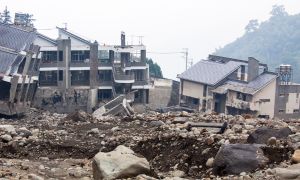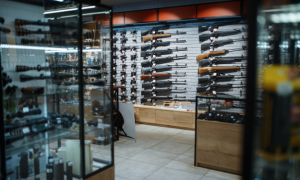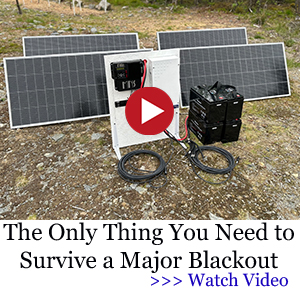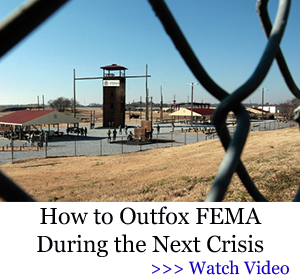9 Signs You Might Be on FEMA’s List

![]()
Of all the alphabet agencies, FEMA is the only one that is authorized by law to confiscate your emergency supplies. When that happens, they’ll ask nicely only once. Then, regardless of your answer, they have the right to enter your house and confiscate your food, water, generator, or weapons.
These people will NOT knock randomly on people’s doors.
Most of the time they already know where to go and what they can confiscate. That’s because they’re working hard and doing their research before SHTF.
And you can bet FEMA is relying on your stockpile to feed the unprepared.
So how do they know what people have on their property? And what do they already know about YOU?
Here are 9 signs you might be on their list:
 This is not something you can change, but you must be aware that FEMA’s employees will probably first research these zones.
This is not something you can change, but you must be aware that FEMA’s employees will probably first research these zones.
So you need to stay vigilant and consider alternative or hidden storage options for your survival stockpile.
This is probably the number one thing FEMA is monitoring. If you have survival food at home right now, FEMA might know about it already, and they won’t hesitate to come and get it if they need to.
What you can do instead of buying online is build your survival food stockpile from regular supermarkets and maybe pay with cash. You can also tailor it to your specific needs this way.
Another thing you can do is have a safe place to store everything. You can keep it in your pantry, but it will be too easy to find if they end up searching your house. I found a solution that I recommend to all of my friends. It’s a cheap and easy-to-build root cellar that’s completely hidden from any prying eyes.
If you’ve recently bought first aid kits, hand crank radios, fuel in high quantities, and water that should last you for more than one year, watch out. FEMA is probably tracking your every move by now.
The big problem here is water. You have two options to keep the government away from your property. One is to buy in small batches. The other is to make a rainwater collection system that will get no attention. I built one similar to this in my backyard, and I have used it constantly for about two years now.
Gun shop owners keep very detailed registers of who bought from them and what.

Federal law requires licensed dealers to maintain records of all firearms sales for at least twenty years.
This includes information like the exact description of the firearm, model, and serial number but also the name, address, and identification used by the buyer.
So if you have a lot of guns in your stash, you’re probably already on FEMA’s list. But if you have a firearm that’s older than twenty years, that might be the safest one in your stash. The older it is, the better. You can also try to buy from more than one store and, if possible, even from different states.
The problem is, conventional search engines are not secure, and your online data and searches are constantly being checked and analyzed.
FEMA is probably not the only government agency that has access to your data, and the laws in this country are not exactly designed to protect innocent people.
Precious metals will be worth a fortune in the future crisis, and it’s wise to have some put aside for dark times. But if you buy gold or silver coins or bars, you may attract some attention from the authorities. A good idea is to buy gold jewelry instead, especially from yard sales and vintage markets. This way you can put aside this precious metal without looking suspicious.
Credit card use is one of the easiest ways for THEM to track every move we make, so as long as you’re still allowed to pay in cash, do it. But if you go to the bank and withdraw all your money, you’ll only attract attention. So pay in cash whenever you can, but take out small batches from the cash machine.
 You don’t want your life to depend on the grid, and FEMA knows that. That’s why they are probably checking generator sales as well.
You don’t want your life to depend on the grid, and FEMA knows that. That’s why they are probably checking generator sales as well.
A good workaround would be if you can assemble your own generator. You can use the blueprint for this alternative solution called the Modular Backyard Power Plant, and you’ll have a reliable 24/7 power source FEMA won’t know anything about.
Be very careful who you talk to about your stockpile and your survival plans. You talk to a work colleague who’s a friend of a friend who works for FEMA. The next day they’ll do a background check, and you’re on their list. And whatever you do, don’t let your neighbors know what you have on your property. When things go bad, your neighbors could turn into looters in a matter of days. And if that happens, you don’t want them to know your survival plans inside and out.
Maybe FEMA is watching your every move, but there are a lot of things you can do to make sure you never make it on their list in the first place. They’re still a government institution, and as we’ve seen often, they’re not the most effective. That’s probably one of the reasons they rely on your stockpiles and why they’ll continue to keep a close eye on people like you and me. When SHTF, they will try to fill the gap between the prepared and the rest of the population.
So keep doing what you’re doing to keep your family safe, and if you want to be even more prepared, click here for 70+ ingenious projects you need to outlast any crisis.
You may also like:
 8 Myths About Storing Water That Are Actually True
8 Myths About Storing Water That Are Actually True
The First States That Will Go Down During Martial Law. Do You Live in the Red Zone? (Video)
How to Repurpose Old Items Into New Projects for Your Backyard
17 Items That Vanished Immediately After the Pandemic
